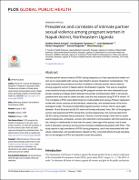| dc.description.abstract | Intimate partner sexual violence (IPSV) during pregnancy is of key reproductive health concern as it is associated with various risks linked to severe intrapartum complications. This
study assessed the prevalence and the correlates of intimate partner sexual violence
among pregnant women in Napak district, Northeastern Uganda. This was an analytical
cross-sectional study conducted among 284 pregnant women who were obtained by systematic sampling in Napak district between November and December 2020. A structured
questionnaire was used to collect the data, and this was analyzed using STATA version 15.
The correlates of IPSV were determined at a multivariable level using a Poisson regression
model with robust variance at the individual, relationship, and societal levels of the socioecological model. The study enrolled 284 pregnant women of whom, 65.5% were aged
between 18 and 28 years and 62.0% were not formally educated. Also, 56% of the pregnant
women had experienced IPSV during their current pregnancies, the most prevalent form
(35.6%) being unwanted sexual advances. Factors of women being in their third or subsequent pregnancies, primiparity, women who rated their communication with their partners as
low, being in a relationship for less than five years, lower age of the spouse, and a lower
level of education (primary) among women showed a statistical association with IPSV. This
study reports a high prevalence of IPSV during pregnancy, and it was associated with individual, relationship, and societal factors. Based on this, concerted efforts through sensitization on the dangers of IPSV are required to avert the practice. | en_US |


